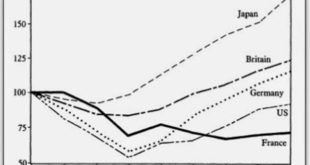[This article originally appeared in the January 4 edition of Lewrockwell.com.] The culprit responsible for the Wall Street crash of 1929 and the Great Depression can be easily identified—the government. To protect fractional reserve banking and generate a buyer for its debt, the US government created the Federal Reserve System in 1913 and put it in charge of the money supply. From July 1921 to July 1929, the Federal Reserve inflated the money supply by 62 percent,...
Read More »The Government Throws Money at Heart Disease, but Prevention Is Better than Cure
You’re more likely to die of heart disease than anything else, partly because, well, if nothing else gets you, your heart will give out. And a heart attack could cost you upwards of $760,000 these days, when you consider hospital charges, prescription drugs, additional care for the rest of your life, and then indirect costs like loss of time at work. Up to 80 percent of premature heart disease can be prevented simply by the adoption of a healthy diet, regular...
Read More »The Chimera of a Postpandemic Postwar Return to Monetary Normal
The monetary regime in power now—the so-called 2 percent inflation standard—is promising us a “return to normal” after the great pandemic and war inflation of 2021–22. At this time of powerful propaganda—the dismal accompaniment of natural disaster and war—we should be on our guard against such messaging. Even more so when we consider the success of this regime in repudiating blame for the great asset inflation culminating in the global financial crisis of 2008,...
Read More »Micronations in International Law: How US Policy Could Improve the Fortunes of Upstart Libertarian Countries
After years spent toiling as an activist against the tide of Czech politics, Vít Jedlička concluded that it would be easier to build a libertarian nation from scratch somewhere else. In April 2015, he declared that a new country called the Free Republic of Liberland would be founded on unclaimed land on the Danube River. Legal scholars Harry Hobbs and George Williams reject the prevailing perspective that Liberland and other similar initiatives are “mere oddities”...
Read More »The Senator Who Didn’t Know (but Thought She Did)
Legislators have a strange relationship with magic. To achieve that which physically cannot be done, they like to wave magic wands and pretend that it can. Reality puts a limit on political power, a realization that always sits poorly with those in charge of our trillion-dollar bureaucratic machinery. Senator Elizabeth Warren is a stunning case in point, and she’s had her aim at the magic-seeming world of digital assets like bitcoin for a while. Last month she...
Read More »America, Brazil, and the Illegitimacy of Weaponized Democracy
In recent years, it has become popular in parts of conservative discourse to discuss the “Brazilianization of America,” a reference to the challenges a large country faces in governing an increasingly multicultural “universal nation.” But this weekend, it was the Americanization of Brazilian politics that took center stage as pro-Bolsonaro forces rose up in aggressive protest against the newly inaugurated Lula regime, in a move reminiscent of what played out in...
Read More »The Constitution Failed. It Secured Neither Peace nor Freedom.
If one cares to look, it’s not difficult to find numerous columns written for mainstream news outlets announcing that the US Constitution has failed. This ought to raise the question of “failed to do what?” The answer depends largely on the one claiming the constitution has failed. On the Left, claims of constitutional failure generally revolve around the idea that the constitution doesn’t empower the federal government enough. For example, Chris Edelson of the...
Read More »Why Economic Stimulus Can’t Work
President Barack Obama returned from the 2010 G20 Summit held in Toronto having failed to convince world leaders that more “economic stimulus” was needed to cure what ails the world’s economies. Walking a seeming tightrope between too much spending and spiraling deficits, on the one hand, and too little spending and economic recession, on the other, world leaders reluctantly agreed to err on the side of fiscal and monetary caution and to halve deficits in three...
Read More »The Present Fiat Monetary System Is Breaking Down
The heart of economic growth is an expanding subsistence fund, or the pool of real savings. This pool, which is composed of final consumer goods, sustains individuals in the various stages of the production process. The increase in the pool of real savings permits the expansion and the enhancement of the infrastructure, and this strengthens economic growth. An increase in economic growth for a given stock of money implies more goods per unit of money. This means that...
Read More »Rome’s Runaway Inflation: Currency Devaluation in the Fourth and Fifth Centuries
By the beginning of the fourth century, the Roman Empire had become a completely different economic reality from what it had been at the beginning of the first century. The denarius argenteus, the empire’s monetary unit during the first two centuries, had virtually disappeared since the middle of the third century, having been replaced by the argenteus antoninianus and the argenteus aurelianianus, numerals of greater theoretical value, but of less and less real...
Read More » Swiss Economicblogs.org
Swiss Economicblogs.org










